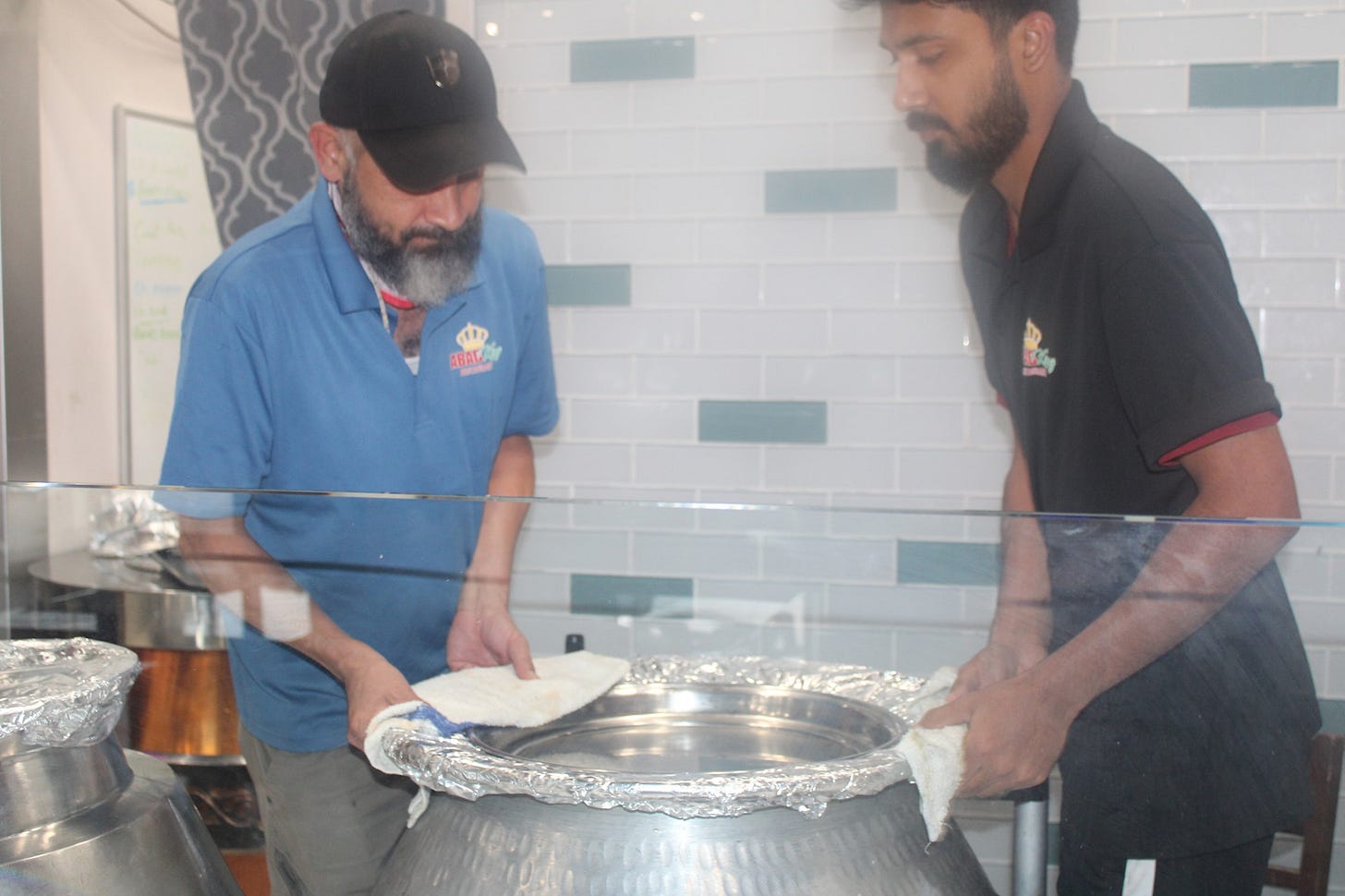One Night at Kabab King
Qamar Hayat brings a taste of home to Jimmy Carter Blvd for Atlanta’s growing Pakistani community
It’s 5:45 on a Thursday evening and the atmosphere in the air at Kabab King, a Pakistani restaurant off Jimmy Carter Blvd, is electric.
Customers are drifting towards the front counter, forming a wide circle. Qamar Hayat, Kabab King’s owner, wearing his signature green cap, takes his place next to three giant metal pots. A hush descends. A young woman dressed in a shalwar kameez stands across from him, her phone pointed directly at him.
The Kabab King evening Facebook Live broadcast begins, “As salaamalaikum mere dosto aap logo ke muhubatthay alhamdillailah jis tereekay hum everyday live aathay hai,” (Salaam my friends and with your love, thanks to God we are live again as we are every evening here at Kabab King)” says Qamar, his voice booming across the restaurant.
He describes the evening’s specials - beef pilau, chicken pilau, and beef haleem. At various points in his four minute broadcast, he breaks out into spontaneous poetry praising God, the food, and encouraging people to take a break from their cooking and come into Kabab King.
Two men behind the counter, wearing Kabab King shirts, are waiting for their cue. As soon as Qamar says Bismillah! - one of them lifts the lid of the first pot. Steam billows out, clouding Qamar’s face. The camera zooms in, revealing the beef pilau - tender beef slow cooked with rice and a myriad of South Asian spices.
This ritual wasn’t always part of the food scene for Pakistanis in Atlanta. In the early 1990s, there was just one Pakistani restaurant in the entire metro Atlanta region - Mughals. Also located off of Jimmy Carter Blvd, it started out as a bare bones cafe catering directly to Pakistanis looking for the taste of home they couldn’t find at the Indian restaurants around town- a place that served classic Pakistani dishes like nihari, paya, and haleem.
But now, there are a lot more options. As the community in metro Atlanta grew, so did the number of restaurants. There are almost 12,000 Pakistanis in the area, up from about 9,000 a decade ago. Almost half of these families live in Gwinnett County. Jimmy Carter Blvd, a major thoroughfare of immigrant businesses in Gwinnett County, is home to at least seven other Pakistani restaurants. Three of them are located in the same strip mall as Kabab King.
What distinguishes Kabab King from the others - and contributes to its steady stream of mostly Pakistani customers - are the deghs - metal pots often used in South Asia to cook large quantities of stews and rice dishes like biryani, pilau, and haleem.
When Qamar moved to Atlanta in 2014, he says he noticed that food in restaurants was often reheated. His motto - food should be fresh. That’s why he says, everyone loves “ghar ka khanna,” home cooked food. At the time, he says no other restaurants were cooking with deghs - “it’s such a big quantity, maybe they thought they wouldn’t be able to sell all of it.”
Qamar was determined, so he tried anyway. Three years after arriving in Atlanta, he opened Kabab King. He started doing Facebook lives highlighting daily degh specials - and Kabab King’s followers on Facebook (now at 110K) and customers, have been growing ever since.
On any given week, Qamar says anywhere from 700 to 1000 people come into the restaurant. The customer base is mostly Pakistani and Indian, but also some Americans - “food lovers” - he says. And contrary to national trends, when COVID hit, he says his business really took off. The restaurant switched to takeout only and there were times, he says, that there were 60 to 70 cars lined up outside. “People really wanted fresh food.”
Qamar’s days are busy, but still, he’s happy in Atlanta. "Life here is easy, peaceful and not too fast.”
He also gets to do what he loves, “Basically, I love my business.”
It’s not just feeding people that he loves, it’s creating a sense of home for Pakistanis in Atlanta, “I’m not the only one missing - everyone is missing home,” he says. And so with each deg, each Facebook live, each photo on the wall of his restaurant, Qamar finds joy in creating a little semblance of home for himself and his community.







